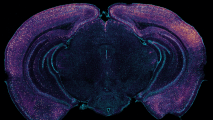The FDA has approved the first ever therapy for Rett syndrome, a rare genetic neurodevelopmental disorder that disproportionately affects women and girls. The drug is called trofinetide and will be sold under the trade name Daybue.
“Today marks an important milestone for the Rett community and Acadia,” Steve Davis, CEO of maker Acadia Pharmaceuticals, said.
“As the first FDA-approved drug for the treatment of Rett syndrome, Daybue now offers the potential to make meaningful differences in the lives of patients and their families who have lacked options to treat the diverse and debilitating array of symptoms caused by Rett syndrome.”
The FDA has approved the first ever therapy for Rett syndrome, a rare genetic neurodevelopmental disorder that disproportionately affects women and girls.
What is Rett syndrome? Rett syndrome is caused by a mutation of the gene MECP2, which is located on the X chromosome. Symptoms range from mild to severe and impact speech, motor function, eating, and breathing; its calling card is near-constant repetitive hand movements.
Patients with Rett syndrome may also display some symptoms associated with autism disorders, including social withdrawal and communication difficulties — it was once classified as an autism spectrum disorder, Spectrum News’ Shaena Montanari noted.
“Rett syndrome is a complicated, devastating disease that affects not only the individual patient, but whole families,” Melissa Kennedy, CEO of the International Rett Syndrome Foundation, said in Acadia’s press release.
There are an estimated 6,000 to 10,000 patients with Rett syndrome in the US, with Acadia’s market research showing around 4,500 of them actively seeking treatment with physicians, FiercePharma reported.
The trial: The FDA’s approval was based on the results of LAVENDER, a phase 3 trial of trofinetide versus a placebo in 187 female patients with Rett syndrome spanning from ages five to 20.
The effect was measured by a change in the scores of two different assessments — the Rett Syndrome Behavior Questionnaire (RSBQ) and the Clinical Global Impression-Improvement (CGI-I) — after 12 weeks receiving the drug or placebo. The RSBQ is given by caregivers and evaluates symptoms; the CGI-I is administered by physicians and measures if patients have worsened or improved.
Patients who received trofinetide had 5.1 points reductions in their RSBQ score, compared to 1.7 points in the control group, Montanari reported. Patients especially noticed benefits when it came to the ability to eye gaze and to use their hands for communication, Kathie Bishop, Acadia senior VP and head of rare disease and external innovation, told FiercePharma.
RSBQ was developed before genetic testing to confirm Rett syndrome, and has detractors, Montanari reported, a known issue in the Rett community.
The CGI-I scale also showed improvements, although David Liberman, of Boston Children’s Hospital, told Montanari that, despite being on the “minimally improved end of things,” the drug still performed better than any other attempts at treating neurodevelopmental conditions. Liberman was involved with the phase 3 trial.
Patients especially noticed benefits when it came to the ability to eye gaze and to use their hands for communication.
The future: Daybue is an oral liquid, and because Rett syndrome is chronic, it most likely will need to be taken daily, Bishop told FiercePharma.
While Acadia did not release any pricing information, analysts from SMBC Nikko Securities and RBC Capital Markets launch list prices of $450,000 and $425,000, respectively, per Reuters.
“This is a historic day for the Rett syndrome community and a meaningful moment for the patients and caregivers who have eagerly awaited the arrival of an approved treatment for this condition,” Kennedy said.
We’d love to hear from you! If you have a comment about this article or if you have a tip for a future Freethink story, please email us at [email protected].





